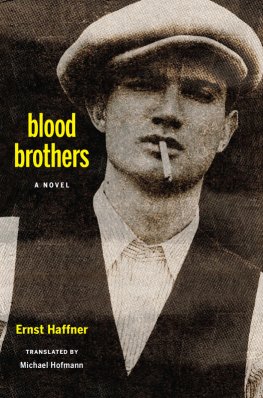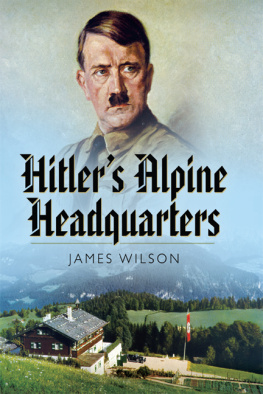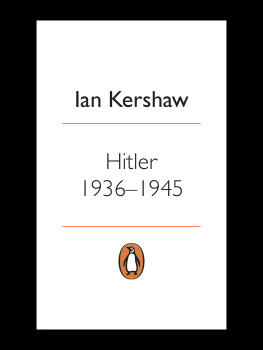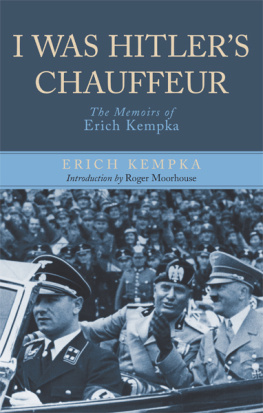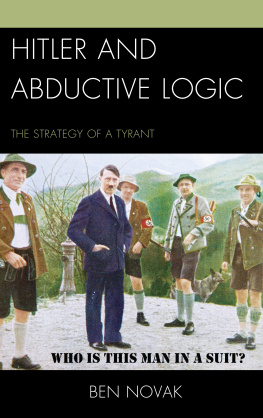
The Meaning of Hitler
by S ebastian Haffner
Translated from the German
by Ewald Osers
Published by Plunkett Lake Press , July 2012
www.plunkettlakepress.com
Estate of Sebastian Haffner
Translation Estate of Ewald Osers
Original ly published in Germany by Kindler Verlag GmbH under the title Anmerkungen zu Hitler (1978)
First American editions by Macmillan Publishing (hardcover, 1979) and Harvard University Press (paperback, 1983)
Cover: Susan Erony and Erika Marquardt; Have We Gone Too Far ; one of one-thousand paintings; mixed media on canvas framed in lead; 5 x 7 ; 1998-2008
~ Other eBooks from Plunkett Lake Press ~
By Sholom Aleichem
From the Fair
By Helen Epstein
Children of the Holocaust
Joe Papp: An American Life
Music Talks: The Lives of Classical Musicians
Where She Came From: A Daughters Search for Her Mothers History
B y Eva Hoffman
Lost in Translation
By Peter Stephan Jungk
Franz Werfel: A Life in Prague, Vienna, and Hollywood
By Heda Margolius Kovly
Under A Cruel Star: A Life in Prague, 1941-1968
By H illel Levine and Lawrence Harmon
The Death of an American Jewish Community : A Tragedy of Good Intentions
By Jan Masaryk
Speaking to My Country
By Susan Quinn
A Mind of Her Own: The Life of Karen Horney
Marie Curie: A Life
B y Vlasta Schnov
Acting in Terezn
By Susan Rubin Suleiman
Budapest Diary: In Search of the Motherbook
By Friderike Zweig
Married to Stefan Zweig
By Stefan Zweig
Adepts in Self-Portraiture: Casanova, Stendhal, Tolstoy
Amerigo: How America got its N ame
Balzac
Dostoevsky by Zweig
Freud by Zweig
Joseph Fouch: Portrait of a Politician
Mental Healers : Franz Anton Mesmer, Mary Baker Eddy, Sigmund Freud
The Struggle with the Daemon: Hlderlin, Kleist, Nietzsche
The World of Yesterday
Three Masters: Balzac, Dickens, Dostoevsky
For more information, visit www.plunkettlakepress.com
Contents
Life
Achievements
Successes
Misconceptions
Mistakes
Crimes
Betrayal
Life
Adolf Hitler s father made a success of life. The illegitimate son of a servant girl, he rose to become a state official of administrative rank and died honoured and respected.
His son began by making a mess of his life. He did not finish school, failed his entrance examination at the Vienna Academy of Arts, and spent the time from his eighteenth to his twenty-fifth year in Vienna and then in Munich, doing nothing and aspiring to nothing. His orphans pension and the occasional lucky sale of a painting kept the young Bohemian afloat. At the outbreak of war in 1914 he volunteered for the Bavarian Army. There followed four years of front-line service, during which courage earned him both classes of the Iron Cross but lack of leadership qualities prevented him from rising above the rank of corporal. After the end of the war, which he witnessed as a gas casualty in a German military hospital, he remained a barracks dweller for a further year. He still had no plans or prospects of a job. He was then thirty.
At that age, in the autumn of 1919, he joined a small radical Right-wing party, in which he soon played a leading role, and that was the beginning of a political career which eventually made him an historic figure.
Hitler lived from 20 April 1889 until 30 April 1945, i.e. almost exactly fifty-six years. The difference between his first thirty and the following twenty-six years seems to be inexplicable. For thirty years he was an obscure failure; then almost overnight a local celebrity and eventually the man around whom the whole of world policy revolved. How does that go together?
Although that difference has provoked numerous explanations it is in fact more apparent than real, not merely because Hitlers political career continued to be disjointed during its first ten years, and Hitler the politician turned out in the final analysis to be a failure, albeit on a supreme scale, but mainly because Hitlers personal life remained poor and stunted even during the second, public, period of his life. By contrast, closer inspection of his inner political life during the first, outwardly uneventful, decades of his life reveals many unusual features features which foreshadowed much that followed.
The division which certainly marks Hitlers life does not cut across it but runs through the whole. Not all weakness and failure before 1919, all vigour and achievement after 1920. But before and after an exceptional intensity of political living and feeling alongside an exceptional meagreness of personal experience. The obscure Bohemian of the pre-war years was living and inwardly working on the political scene of his day as though he were a top politician; and the Fhrer and Reich Chancellor remained, in his personal life, a successful Bohemian. The decisive characteristic of his life is its one-dimensionality.
Many biographies carry as a sub-title under their heros name: His life and times, with the word and dividing rather than uniting. Biographical and historical chapters alternate; the great individual stands, in the round, before a background of two-dimensional contemporary events. He stands out from his time as much as he intervenes in it. A life of Hitler cannot be written in that way. Everything that matters in it blends with history, is history. The young Hitler reflected it; the man of middle years still reflected it but began to influence it; the later Hitler determined it. First he was made by history, then he made history. That is worth looking at. The personal side of Hitlers life consists essentially of non-events after 1919 as much as before. Let us dispose of them briefly.
His life lacked before and after everything that normally lends weight, warmth and dignity to a human life: education, occupation, love and friendship, marriage, parenthood. Apart from politics and political passion, his was an empty life and hence one which, though certainly not happy, was strangely lightweight, and lightly discarded. A continuous readiness for suicide accompanied Hitler throughout his political career. And at its end, almost as a matter of course, stood a real suicide.
Hitlers celibacy and childlessness are well known. Love played an unusually slight part in his life. There were a few women, but he treated them as unimportant and did not make them happy. Eva Braun attempted suicide twice because she felt hurt and neglected (He only needs me for certain purposes); her predecessor, Hitlers niece Geli Raubal, actually did commit suicide probably for the same reasons. Hitler was on an election tour and had not taken her along; her action compelled him, for once the only time to interrupt something that was more important to him, for her sake. Hitler mourned her and replaced her. This melancholy story is what comes closest to a great love in Hitlers life.
Hitler had no friends. He enjoyed sitting for hours on end with subordinate staff drivers, bodyguards, secretaries but he alone did all the talking. In this servants quarters atmosphere he unwound. Real friendship he avoided all his life. His relationships with men such as Goering, Goebbels or Himmler always remained cool and remote. Rhm, the only one of his paladins with whom he was on familiar terms from early days, he had shot, principally, no doubt, because he had become politically inconvenient. However, the old intimacy certainly proved no obstacle to his removal. If one reflects on Hitlers general shyness one is almost led to suspect that Rhms superannuated claim to friendship was, if anything, an additional reason for getting rid of him.
Next page

